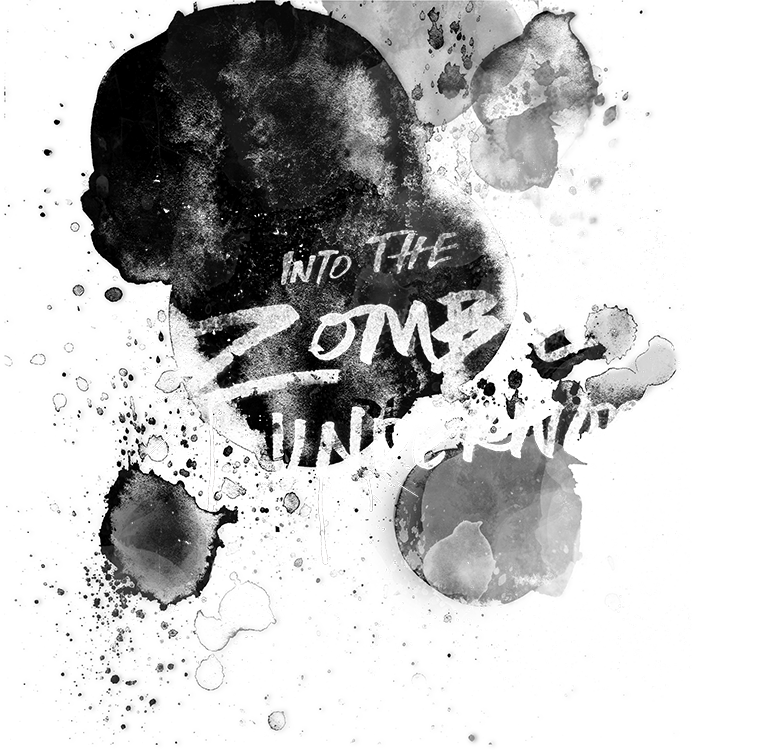I
I moved to Haiti in the spring of 2007, when my wife found a job with the United Nations' peacekeeping mission there, established after the fall of Jean-Bertrand Aristide in 2004. She was assigned to Jérémie, a small town on Haiti's southwest coast. Jérémie is just 125 miles or so from Port-au-Prince, but only a dirt road links the two cities, and the trip can take 14 or 15 hours, if the road is passable at all: When the summer rains set in or the fall hurricanes blow through, the road is just mud. The weekly boat to Port-au-Prince is slow and dangerous. Otherwise, the only connection to the capital is by propeller plane.
About a month after I arrived in Jérémie, a rumor swept through town that a deadly zombie was on the loose. This zombie, it was said, could kill by touch alone. The story had enough authority that schools closed. The head of the local secret society responsible for the management of the zombie population was asked to investigate. Later that week, Monsieur Roswald Val, having conducted a presumably thorough inquiry, made an announcement on Radio Lambi: There was nothing to fear; all his zombies were accounted for.
Shortly after that incident, I started taking Creole lessons from a motorcycle-taxi driver named Lucner Delzor. Delzor was married with four children, but he kept a mistress on the other side of town. He told me that he had never so much as drunk a glass of water at his mistress's house for fear she might lace his food with love powder. He loved his wife and children far too much to risk that.
One of my first complete sentences in Creole was "Gen vréman vre zonbi an Ayiti?" Or: "Are there really, truly zombies in Haiti?"
"Bien sûr," Delzor said. He had even seen them: affectless men and women with a deathlike pallor, high nasal voices, and the characteristic drooping at the chin – men and women who he knew for a fact had died and been buried.
"Ayiti, se repiblik zonbi," Delzor added. Haiti is the republic of zombies.
I was eager to meet a zombie for myself, and began making appropriate inquiries. Several weeks later, my wife came home from a judicial conference. Making small talk, a local judicial official mentioned the strange case of zombification that his courtroom had seen not several months before. The case was, he said, "un peu spectaculaire."
I met Judge Isaac Etienne a week or so later at his unfinished concrete house in the village of Roseaux. Roseaux is on the sea, and the fishermen, their nets already in, were stretched out on the small grassy town square, drinking rum and playing dominoes under a dazzling midmorning sun. The judge was a boyish-looking man of 42, slender, wearing baggy surfer shorts, flip-flops, and a brightly colored Hawaiian shirt.
The dossier was, at bottom, a murder story, the judge said – but it was a murder story with the great oddity that the victim did not die.
II
Nadathe Joassaint had been, until her death at 26, a native of the village of Joseph, in the third section of the commune of Roseaux, deep in the mountains. Her father was a small farmer; her mother lived in Port-au-Prince, where she worked as a merchant. Nadathe (pronounced na-DAHT) was known for her beauty; had she not been so beautiful, she would have lived. Early in the morning of November 7, 2006, somebody called Nadathe out of her hut. Immediately thereafter, she became ill, then later that night she was dead.
Two months or so later, in mid-January of 2007, Judge Etienne was just finishing breakfast when the huissier of his court announced that a large mob – he estimated the size at more than 100 people – had assembled outside his courtroom, demanding his immediate presence. The crowd was led by Madame Zicot Joassaint, the victim's mother, who, after several weeks' manhunt, was bringing to justice the men she claimed were responsible for her daughter's death.
Judge Etienne was not alarmed by the situation: He was accustomed to crowds arriving at all hours of the day, dragging criminals caught en flagrant délit and demanding justice. The crowd was chanting "Mano, Kriminèl. Mano, Kriminèl." The mood, the judge recalled, was festive.
In front of the courthouse, two men – Neolién Frankel, known by his nickname, Mano, and Joseph Overne – were sprawled in the dirt. They had both been badly beaten. Mano was young and small, Overne older and larger. Both wore jeans and T-shirts and both had identical looks on their faces, of submission and terror. Judge Etienne opened the courthouse and proceeded to the bench. The dilapidated courtroom was small, and the crowd spilled out into the street. He organized the accused in front of his desk, to his right, and invited the accuser, Madame Zicot, to come forward.
A woman in her mid-60s, her hair in braids, dressed in a neat blue-and-white striped dress, Madame Zicot drew herself up to her full five feet, then leveled one of the few accusations in the criminal code more spectacular than murder.
"Li te mete tifi pam nan zonbi! Remèt li!"
He turned my daughter into a zombie! Give her back!
III
In 1982, Wade Davis, then a doctoral candidate in ethnobotany at Harvard, traveled to Haiti to explore the secrets of zombification. His work was sponsored by a pharmaceutical company, the supposition being that the zombie's apparent death was illusory, a transient, paralyzed, coma-like state produced by some sort of poison or chemical agent. Such a poison, Davis's backers supposed, might very well prove pharmacologically useful as an anesthetic.
Davis's first book, The Serpent and the Rainbow, is his account of that trip. The book bristles with machismo, in highly wrought prose: "Marcel came so close I could feel his breath, smell it like a buzzard's. The silence was unbearable, yet only I could break it." And Davis's Haitians tend to say things like: "Haiti will teach you that good and evil are one. We never confuse them, nor do we keep them apart." But for all its bluster, The Serpent and the Rainbow is an admirable book, unfailingly interesting, and at times captures in a single sentence something very much like the Haiti that I came to know: "There in the late afternoon sun was a single individual, quite sane and very happy, standing alone, dancing with his own shadow."
Such is the book's narrative power that the author's conclusions about zombies are almost swept away in the adventurous flood, and it is most likely the novelistic quality of his prose that provoked the ferocity of his critics: Ethnologists, pharmacologists, and old Haiti hands alike responded to the book and its author with a collective "Oh, come on."
Davis's second book, Passage of Darkness, is an adaptation of his doctoral thesis on zombification and serves as his response to the critics. It is a book as sober as The Serpent and the Rainbow is overwrought. It demonstrates the value of clear, academic prose, and the importance of the scholarly apparatus – the footnote, citation of sources, the extended bibliography – and has one enormous advantage over The Serpent and the Rainbow: It is convincing. It is the definitive book on zombies.
Davis's thesis – certainly one of the very most sensational in all of ethnography – goes something like this: Zombies, he tells us, are real, not some figment of the collective Haitian imagination but men and women who have died (or rather who appear to have died), been buried, then brought back to life to pass the rest of their days as imbecile slaves. As proof he cites the case of Clairvius Narcisse, a man whose death certificate was signed by an American doctor in Haiti in 1962, only for him to be found again in his natal village in 1980 with a story to tell of years passed in zombie servitude. Davis shows us a photograph of Narcisse, looking hale, standing beside his own grave.
Davis argues that Narcisse and other zombies do not really die but rather are poisoned with a compound containing tetrodotoxin (TTX), found in the crapaud de mer, a fish swimming off the Haitian coast. (Other ingredients in the zombie powder apparently include human cadavers, a variety of plants, and a toad.) The effect of such a poison is to produce a paralytic state so profound that even medical experts are convinced that the sufferer has expired.
The poison, Davis writes, is always applied "directly into the blood through abraded skin." At its onset, it is known to cause "malaise, pallor, dizziness," along with "profuse sweating, extreme weakness, headache, subnormal temperatures, decreased blood pressure, and a rapid, weak pulse." (Here Davis is quoting Bruce W. Halstead's Poisonous and Venomous Marine Animals of the World.) This is followed by dilated pupils, glassy fixed eyes, respiratory distress, muscular twitching, and "finally terminates in extensive paralysis.… The victim may become comatose but in most cases retains consciousness."
The victim, having "died," is buried, and the zombiemakers return in the night. The tomb is opened. The victim, now in the custody of his new masters, is returned to life.
But TTX alone does not make a zombie. TTX is the same poison found in the deadly Japanese fugu fish, whose sushi is a great delicacy. Every year, several gourmand fools, having eaten improperly prepared sushi, fall victim to TTX poisoning, and upon their resuscitation, if they survive, are normal.
Not so the Haitian zombie.
The Haitian zombie, Davis argues, is the product of a series of terrifying experiences, all specific to the cultural context of rural Haiti. First comes the overwhelming trauma of having been buried alive. Clairvius Narcisse reported total lucidity through the entire ordeal. Upon removal from the coffin, the would-be zombie is fed a hallucinogenic drug from the plant Datura stramonium, locally known by the suggestive name concombre zombi. At the same time, the victim is given a ferocious beating by his captors. The final touch is the total rejection of the zombie by his own community. The cumulative effect is the destruction of the zombie's will – what the Haitians call the "ti bon ange," or the good little angel, the unseen thing that gives personality and resolve to each individual soul. The victim is now a zombie, and he knows he is now a zombie: He has fallen into a well-known trap from which no man or woman escapes.
His soul collapses.
The zombie is now like a living corpse.
IV
A precise transcription of Judge Etienne's interrogations of Mano and Overne does not exist, but he took notes in French summarizing their statements, which were made in Creole. The judge allowed me to copy these from his private notebooks.
Judge Etienne began with Mano. "Is it true that you are a sorcerer and responsible for the death of Nadathe? How do you reply to this accusation?"
Mano: "Monsieur le Juge, I have for a long time courted Nadathe – but being engaged to a man she loves, she has never hesitated to respond to my entreaties, calling me a trivial man.… In order to avenge this insult, I went to the house of my superior, Joseph Overne, the man who initiated me as a sorcerer, with the aim of deciding what punishment to give her. We decided to kill Nadathe by one of our fetishistic procedures."
The judge told me that Mano spoke softly, with what the court's clerk later described as an air of sadness and regret – as if the whole nasty business had just slipped out of control. He began to cry.
He paused, then continued: "Overne was more competent than me in the composition of these powders, particularly the powder by which Nadathe was killed. This powder, on account of its rapidity and power, is sometimes compared to the speed of thunder: poud loraj, or 'storm powder.' When we had completed the composition of this powder, I placed it in the middle of the little path where Nadathe passed every morning. Then I called her. I was three meters away from her. I saw her coming toward me. She said, 'What do you want, Mano? What's going on? Why are you calling me?' But for the magic of this trap to work, I was not able to respond."
Mano looked around the room. This was a point on which he was insistent. His voice was choked. "I could not respond!" he said.
"I kept my silence, and Nadathe went up the path to the church, where her youth prayer group was meeting. At this moment, the outcome was decided.… Several hours later, she gave up the ghost."

A cry rang out in the small rural courthouse: "We have found the criminals! They killed Nadathe!" and the crowd exploded. Madame Zicot began to weep, and even the judge himself was forced to stand up and walk outside to wipe the tears from his face. Only after several minutes did he bring the proceedings back to order.
"The body was buried at 5 pm Friday," Mano said. "By 9 pm we were in possession of her zombie. The next day, Saturday, we held a meeting of our band of sorcerers.… We decided to take the zombie to Chardonette, passing by the village of Carrefour Charles. But we were held back there and forbidden passage by the chief sorcerer of Carrefour Charles. According to the rules governing occult societies, we needed to have a laissez-passer signed by the departmental chief, allowing us to transport the zombie. As a result, the zombie of Nadathe was seized. Not having the appropriate papers, we went back home, empty-handed – for this was an act we had performed without the approval of our chief. We had thought we could take the zombie as contraband, without papers! But this, unfortunately, did not bear fruit.… Now the zombie can be found in the hands of the chief of Carrefour Charles, Madame Precieuse St. Louis."
V
But Judge Etienne did not believe that Article 246 applied to either Mano or Overne. These men, he reasoned, had confessed to employing magical means to zombify Nadathe, not a "substance," and there is no provision in the Haitian legal code for the punishment of sorcery. Judge Etienne told me that he had no choice but to release the men – much to his displeasure.
He was convinced, though, that the men had transformed Nadathe into a zombie, knew where the zombie was, and could help Madame Zicot get her daughter back. For this reason, having held the men in his home for two days, very early in the morning of Sunday, January 21, 2007, he gave the accused back to the leaders of the mob, who headed up the mountains in the direction of Carrefour Charles.
Several hours later, the judge received a series of urgent phone calls from that village. The situation had become tense. By the time Judge Etienne was able to get to Carrefour Charles, he found the men he had released that morning on the front porch of Madame Precieuse St. Louis, the accused sorceress. Witnesses said the men looked like they had sustained another beating. Madame Precieuse had barricaded herself in her home.
Judge Etienne spent 15 minutes or so talking with Madame Precieuse, asking her if she knew the whereabouts of the zombie. She categorically denied any knowledge of the incident.
The intensity of the crowd made further discussions untenable. Judge Etienne ordered both Mano and Overne arrested and took Madame Precieuse into custody as well – for her own protection, he said. All three were transported to the central prison in Jérémie. Four days later, Judge Etienne ordered Madame Precieuse freed. Mano and Overne remained in jail for almost two months, charged with a crime that doesn't exist – "sortilege," or sorcery. Then both men were released as well, on the orders of a higher judicial authority in Jérémie. Within days they were back in Joseph, where the local population hacked the men to death with machetes.
VI
Over the course of the next year, I visited Joseph, Nadathe Joassaint's village, at least a dozen times, usually traveling with my Creole teacher, Delzor. Joseph, a place of spectacular, claustrophobic beauty, was accessible only by foot. I spoke with Nadathe's cousins, her sisters and brother, her friends, and her father, but it was only after almost a year of research that I finally found Nadathe's mother, Madame Zicot Joassaint. (Madame Zicot was born Enette Paul but as per Haitian custom is known by her husband's first name.) After I met her, I realized that Nadathe's life, like her death, had been, after its own fashion, extraordinary.
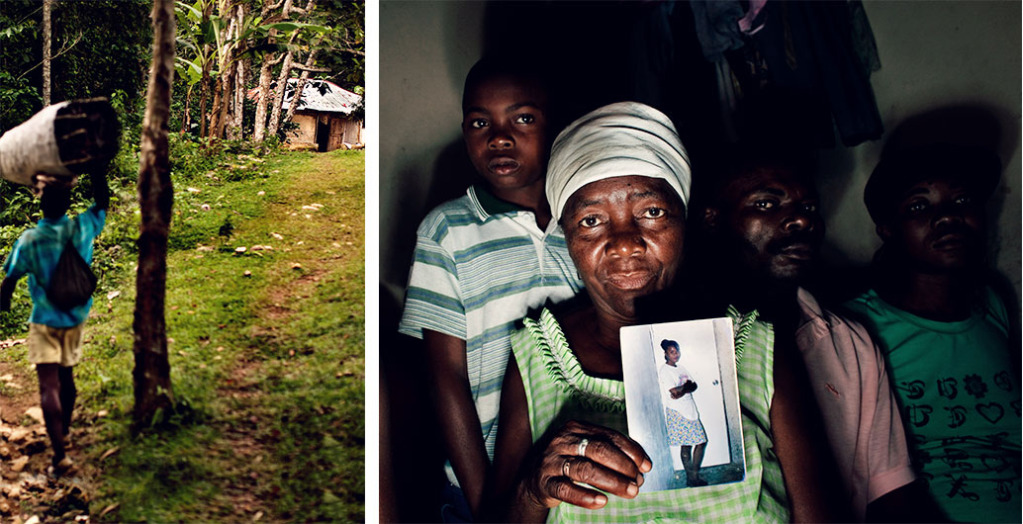
Nadathe Joassaint was born in Joseph on June 6, 1980, the fourth of five children. The geographical center of the village is a dilapidated church, which doubles as the elementary school. Other landmarks include the cockfighting ring, a small shrine to Baron Samedi (the Lord of the Dead), and a spreading mango tree notable for the quality of the cell phone reception in its shade, within sight of the unmarked grave where Mano and Overne are buried. Otherwise the village sprawls: little tin-roofed house, fence, and garden after little tin-roofed house, fence, and garden. It is not quite one of the poorest places in the Americas, if only because of the coffee trees – coffee being a cash crop – but it's close: There is no electricity, and the nearest water source is the river, about a kilometer down the slope of a mountain.
When Nadathe was 14, Madame Zicot left her husband and moved to Port-au-Prince, taking Nadathe and the other children with her. There was no school in Joseph beyond the elementary grades, and Madame Zicot saw Nadathe's intelligence and ambition, saw a child who loved beautiful things and wanted them. Madame Zicot foresaw nothing for her daughters in Joseph but a lifetime of carrying water from the river up the big hill. Madame Zicot, working first as a domestic servant, then in the market, would eventually find the means to buy her own tiny cement house in a twisting warren of tiny cement houses, all with a dramatic view over Port-au-Prince to the sea.
The move to the city did just what her mother hoped it would: It transformed the village girl into a self-sufficient, sophisticated young woman. The girls left behind in Joseph talked about Nadathe and gossiped about her and wanted to be just like her. Nadathe wore beautiful, chic clothes, which she paid for with money she earned in the market. If life in the city and hard work hadn't made Nadathe rich, exactly, it had made her something equally rare in rural Haiti: It had made her free.
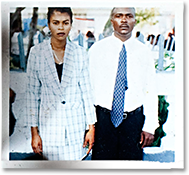
When she was 20, Nadathe returned to Joseph on vacation and went to a kompa dance in a nearby village. Ordinarily she'd rather have been working than dancing, her mother told me. But she went to this dance and there met her future fiancé, Ascqué Neville, 10 years or so older than her, very handsome, and very kind. He had a thick mustache, heavy shoulders, deeply inset melancholy eyes, and a shy demeanor, perhaps on account of his slight stutter. Ascqué followed Nadathe to Port-au-Prince and found work as a mechanic. They lived together in a little house of their own, not far from Madame Zicot.
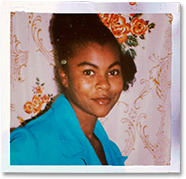
I was able to find a few photographs of Nadathe. One shows her standing on the steps of a concrete house, about a year before she died. It must be in Port-au-Prince: There are no houses like this in Joseph, not with glass windows and cast-iron railings. She is light-skinned – people said she was as light as a blan, but in truth about the color of Barack Obama, another thing that gave her that air of big-city, faraway glamour. She is wearing sunglasses, a stylish blue jacket over a white dress, and sensible pumps. A small handbag dangles from the tips of her fingers: This might be a churchgoing outfit, a supposition consonant with her well-known piety.
Another photograph, which she had given to a relative, was passport-size and shows a teenage girl, self-conscious but nevertheless wholly self-confident, her chin balanced on a carefully posed forearm. On the back, Nadathe wrote in French, in a girlish cursive: "May this birthday be filled with those beautiful little photos that gladden the heart!" Then in English: "I Love you!"
In the spring of 2006, Nadathe returned to Joseph for an extended vacation. She had been working hard for years and was exhausted. Ascqué Neville's mother suggested that she come back to the village, where her fatigue could be treated with an herbal preparation. The treatment was successful, but Nadathe was in no hurry to return to Port-au-Prince.
Sometime in the fall, Nadathe attended a voodoo dance. In the course of the evening, Mano made a pass at Nadathe's younger cousin. She pushed him away and cursed him, calling him a "vòlè bèf" – a cattle thief. Mano hit her.
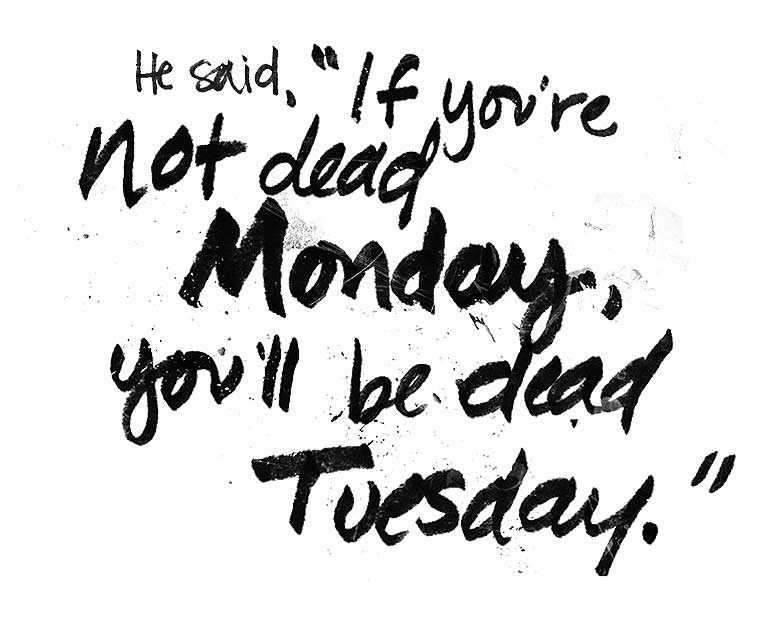
Nadathe stepped forward, pushed Mano backward – she was a large, strong young woman.
Nadathe shouted to be heard above the din of the drums and the cries of those possessed by the gods: "A man like you, how dare you love a little girl like that! How dare you beat her! She's a child!"
Mano was furious. He called Nadathe a whore, and then one of the most vulgar of all Creole insults: pitit, or a woman who has aborted her child. (This is a common Creole insult and does not imply that Nadathe had ever, in fact, had an abortion.)
"I'd rather be a whore, I'd rather have aborted my child, than be a cattle thief like you," Nadathe said.
He said, "If you're not dead Monday, you'll be dead Tuesday."
On that Monday, Nadathe spoke with her mother in Port-au-Prince. Nadathe told her mother just how successful the herbal treatment was, how much better she felt. She advised her mother to come down to Joseph to undergo the same treatment. It was decided: Madame Zicot would come down in December. This was the last time Madame Zicot spoke with her daughter.
Tuesday morning, very early: Sometimes the clearest, hottest days are in hurricane season, as huge storm systems brewing over the Atlantic suck up the local weather, leaving behind only clear blue skies and sharp yellow light. Nadathe dressed herself in a white T-shirt and skirt and wandered down to the pathway in front of the house, still stretching. She came back to the house a few minutes later, looking dazed. She told her sister Dina that Mano had been waiting for her in the path below. Nadathe had said, "Mano, what do you want?" Mano had touched her, on her shoulder, hard, and walked away. Nadathe then did something absolutely atypical: The energetic, industrious young woman went back to bed and slept until noon. She woke up and went to a prayer meeting at the church, where she complained again of fatigue, a vague but powerful sensation of feeling unwell – and an unusual sadness. That evening, Nadathe headed to the house of a Madame Manuel. She had promised to spend the evening with her in prayer.
The next morning, very early, Madame Manuel sent urgent word to the Joassaint family: Nadathe died in the night.
Madame Zicot was in Port-au-Prince when she heard the news about her daughter.
"They called me on Wednesday morning," Madame Zicot later said. "I said, Put an iron on her stomach so I can find her like she died. They told me that Mano killed Nadathe. I said, Mano is going to regret that; she's the only child Mano will kill. I'd rather have lost four cows, if I had them – even if I had only one cow, I'd rather he'd taken it – than kill my child."
She arrived in Joseph just after nightfall on Thursday. Her husband's little house was full of people: Some prayed; women made coffee. Others beat drums, and still others danced. Men played cards and dominoes. Nadathe lay in her elegant, expensive coffin, while paid mourners chanted canticles.
By Friday morning, Nadathe's body began to smell. The villagers carried Nadathe's coffin along the steep mountain trails to the village of Grand Vincent, where Nadathe was buried in the Neville family tomb, beside Ascqué's father.
I later saw the graveyard and tomb where Nadathe was buried. The graves were unmarked. Goats tethered between tombstones munched placidly at the high grass. The cement closing Nadathe's tomb was chipped and loose, but I saw no clear signs that the grave had been disturbed.
VIII
About a week after Nadathe's burial, Madame Zicot received a message from her cousin, Madame Precieuse St. Louis. Madame Precieuse asked Madame Zicot to visit her in Carrefour Charles. Relations between the cousins were never close, and since Madame Zicot moved to Port-au-Prince they had grown only more distant – a wave as the autobus from Port-au-Prince rumbled through Carrefour Charles, or a few words now and again. But Madame Zicot knew that her cousin was a well-known mambo, or sorceress. It was said that Madame Precieuse could fly, and that she could transform herself into a bat, and that she could transform her enemies into animals as well. And, like Mano, she was dyab – a member of a secret society.
When Madame Zicot arrived at her cousin's trim little cottage on the side of the highway, Madame Precieuse wasn't there. Her husband, Fleuris St. Louis, a local politician, explained that his wife had gone to buy a pig to kill. Then finally she came home, a short, round, balding woman with the habit of lifting her shirt and displaying to all and sundry who visit her little house the hysterectomy scar cleaving her neatly in two.
The two women made the small talk of the bereft for a few minutes. Madame Precieuse saw Nadathe just a few days before she died, coming back from the market in Beaumont. Sharp-tongued as ever, the young woman had teased her mother's cousin: They were in the same family, Nadathe had said, but thank God Madame Precieuse was the only bald one!
Then, Madame Zicot later told me, Madame Precieuse got down to business:
First, she said, Nadathe was still alive. She had been zombified. But because she was so young, the secret societies that controlled zombification would not take her zombie into their ranks.
Madame Precieuse continued: If Madame Zicot wanted her daughter back, she was to pressure Mano, beat him if necessary, to convince him to give Nadathe back to her.
Madame Precieuse told Madame Zicot to treat what she told her with the utmost confidentiality.
Nothing in Madame Precieuse's words suggested to Madame Zicot that Nadathe might have been in her custody. So when Madame Zicot finally found Mano two months later and dragged him and his accomplice down to Judge Etienne's courtroom, doing just what her cousin suggested, pressuring him to release the zombie, and he finally confessed, nobody could have been more stunned than Madame Zicot to hear the claim that Madame Precieuse – her own cousin! – had the zombie in her possession all along.
IX
When I spoke with Madame Precieuse, she showed me her hysterectomy scar and the Protestant church where she worships, but she told me that she had nothing to do with voodoo, nothing to do with zombies, nothing to do with magic, and nothing to do with Nadathe Joassaint. This may or may not be true, but that's what she told me.
In the absence of more information from Madame Precieuse, it's necessary to reconstruct the events from the statements of others and their claims of what transpired. According to Mano's testimony, he and Overne were passing through Carrefour Charles with Nadathe's zombie when they encountered Madame Precieuse, who demanded to see their travel documents. (Madame Zicot thinks Madame Precieuse must have approached them because she recognized Nadathe.) Every zombie is made only with the official approbation of the secret society; lacking these documents, the zombie is illicit. (These documents do exist: I was later able to examine a zombie laissez-passer.) Nadathe had no documents. This gave Madame Precieuse grounds to seize the zombie, as she was a great queen within the society, hierarchically superior to Mano and Overne.
But, assuming the story to be true, seizing the zombie would have put Madame Precieuse in a very difficult position, for the rules of the secret society were strict. I later discussed this with various members of the society, who explained to me that Madame Precieuse no more had the appropriate documents to possess and transport a zombie than Mano and Overne did, and by holding the zombie she would risk the harsh punishment of the law and the wrath of other sorcerers. Madame Precieuse might even have feared that she might be zombified herself, for having held the zombie illegally. Thus she apparently conceived her plan: to convince Mano to take Nadathe back to her mother, without ever admitting any involvement in this affair.
But that plan seems to have gone doubly awry. First, Madame Zicot revealed the private conversation between the two cousins to Judge Etienne, thus involving Madame Precieuse with the judicial system. Then, Mano did what no member of a secret society should ever do: He spoke publicly of the "affairs of the night."
When Judge Etienne arrested Madame Precieuse, relations between the two cousins were ruptured. Madame Precieuse blamed her cousin for her disgrace and humiliation – and Madame Zicot's best chance for recovering her daughter's zombie was lost.
X
For obvious reasons, the ethnographic literature on the secret societies of Haiti is thin. The best source is a single chapter in Michel Laguerre's 1989 book Voodoo and Politics in Haiti. The societies, Laguerre argues, are a legacy of colonial Haiti – modern-day descendants of bands of escaped slaves. Nowadays, these secret societies have evolved into something of a cross, in Laguerre's telling, between Cosa Nostra and the Rotary Club: They are violent when necessary but devoted au fond to the cause of justice.
Laguerre offers a portrait of daily life in the society known as the Bizango. There is, he says, a complicated process of recruitment, an initiation ceremony, a period of hazing consisting of nasty jobs like cleaning other members' outhouses, then another ceremony to welcome the full-fledged members involving, Laguerre says, drinking pig's blood. The societies meet regularly at night and march around wearing spooky-looking clothes and singing spooky-sounding songs. ("Be careful about what you might say / When we organize a Bizango rally / We don't wish for people to start talking about our / Songs and dances, the morning after" – but it's way creepier-sounding in Creole.)
For all of the ritual, Laguerre emphasizes, these societies are not well organized. Rivalries between different bands are intense and often result in fights. Prominent sorcerers and magicians will often be members of several societies simultaneously, and an up-and-coming sorcerer might found his own band in a bid to attract power. The secret societies are as chaotic and ill-organized as all Haitian institutions.
In the course of his research on zombies, Wade Davis himself was initiated into the Bizango in a lurid midnight ceremony. He has drawn on Laguerre's work and his own observations to draw two important – and somewhat terrifying – conclusions.
Davis argues that these secret societies have been intensely involved in the governance of Haiti. During the reign of the Duvaliers, when Davis conducted his research, the president of a local secret society was very often the Chef de Section of the same community, in addition to serving as the priest of a large and powerful voodoo temple. The president of Haiti no longer appoints the Chefs de Section, but important elected officials are still, today, often well-placed members of secret societies. These societies control large swaths of rural Haiti.
Second, Davis argues that these societies enforce their power through zombification. Generally, those who are zombified are only zombified after a quasi-judicial proceeding, the zombie having been accused of committing some crime against the community. Clairvius Narcisse, for example, was zombified on account of his failure to support his illegitimate children. Zombification is not the only punishment the secret societies can inflict, but in rural Haiti it is the ultimate sanction, more dramatic even than death. The fear of zombification, Davis argues, is absolutely central to the social system of rural Haiti.
One example will suffice.
I asked Judge Etienne why he released Madame Precieuse from prison. He hemmed and hawed a moment, then admitted: "The state in Haiti ignores the persecution of these secret societies. We need to defend ourselves. I was afraid."
XI
On the same day that Mano, Overne, and Madame Precieuse were arrested, rumor spread through the town of Roseaux that Nadathe's zombie was being transported from Carrefour Charles. Crowds milled about town and waited outside the home of an ambitious young sorcerer, Predieu Dorval. Then members of the local secret society came out on the streets and told the people to disperse. Still, Madame Zicot says witnesses told her that they saw Nadathe arrive at Dorval's house. They said she was wearing a white sheet, her hair long against her neck.
Dorval later told me that he was never in possession of Nadathe's zombie. He did admit, though, that he promised to return Nadathe to her mother and accepted from her 5,000 gourdes, or about $130 – what the average Haitian might make in three or four months – to effect various herbal and spiritual treatments intended to restore the young woman's right state of mind. Finally, after more than a week, Dorval told Madame Zicot that he lacked the unilateral authority to liberate Nadathe and called on Monsieur Roswald Val, the president of the largest secret society in the region, to organize a meeting at which Nadathe's fate would be decided.
Sorcerers from as far away as Port-au-Prince met on the Place Roseaux, the grassy town square overlooking the transparent green sea, a hundred meters or so from Judge Etienne's home. This was a gathering of presidents, emperors, and queens, each accompanied by their secretaries – 32 men and women in all. Normally such a meeting was a private affair, but this afternoon Ascqué Neville and his brother, Louis Jean, were allowed to attend, in deference to the pressing urgency of their claim. The brothers contributed three bottles of the best rum in Haiti, Barbancourt Cinq Étoiles, to a table laden with every kind of drink: beer, clairin, and Coca-Cola. Finally the drunken sorcerers brought to order the business of Nadathe. The Neville brothers had not realized the proposal to return her to her family would be so controversial. There was talk of the repercussions of such a decision: The society would lose its fearsome reputation; the zombies, knowing now that their condition was not final, might revolt.
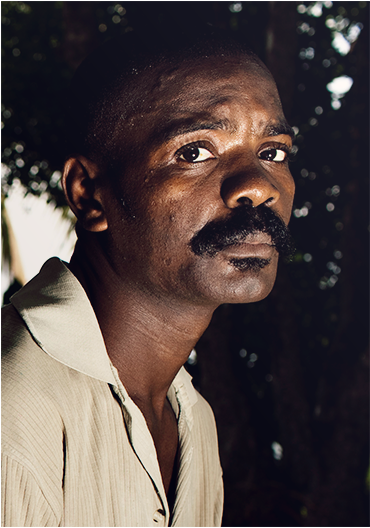
Yet there were those sympathetic to Nadathe and her plight. This was the faction led by Monsieur Val. Nadathe had done nothing, he reminded the others, and neither had her family. At one point, the nervous Ascqué Neville was given the opportunity to speak. He said, "I need my wife so that I can marry her. I need her quickly," and began to cry.
His tears won over the majority, and although no conclusive decision was reached on Nadathe's fate that day, there were only muted objections when Monsieur Val asked Dorval his price to give Ascqué back his fiancée. According to the Neville brothers, Dorval later negotiated in private with them for Nadathe's return, agreeing that the family would pay another 5,000 gourdes – a claim Dorval denies.
Over and over again, according to Madame Zicot and Ascqué Neville, Dorval promised to give back the zombie, each promise sparking a renewed hope, followed inevitably by a crush of disappointment. They say that Dorval failed to attend meetings, invented excuses not to return Nadathe. Then Dorval simply refused to come out of his house altogether.
Madame Zicot then went to visit Monsieur Val, in Jérémie, where she sat with him in his study. But the powers of even the president of the society are limited. The societies are not strictly hierarchical, and Monsieur Val lacked the authority to command another member. Or perhaps he simply didn't want to. Whatever the case, Madame Zicot says he told her, "Madame, do not say yet that your child is lost. Go to the Parquet."
Madame Zicot followed that advice and visited the Parquet, or the higher judicial authority in Jérémie, again availing herself of the authority of the state. This decision would prove disastrous, for it gave that faction of the secret society who opposed Nadathe's release an overwhelming argument: Nadathe's release was only possible if done secretly, quietly, discreetly.
An official in the Parquet's office instructed Madame Zicot to return to Judge Etienne and ask him for her daughter's dossier – the transcript of Mano's and Overne's confessions. Madame Zicot did as instructed. But the once-helpful Judge Etienne was distinctly less helpful now. He refused to give her the dossier, would not entertain her pleas. He was abrupt: "The state knows nothing about the devil's business. I judge the day and not the night."
Madame Zicot now suffered the deepest panic a mother of a missing child can feel: She had no idea where to turn next.
She went back to Monsieur Val. His manner was grave. He told Madame Zicot that the society had held another meeting. The affair had been concluded. Another sorceress, a woman named Ti Soeur, had given a definitive veto to Madame Zicot's plea.
XII
Madame Zicot had been so close – that was the worst thing of all. She told me that she spent the next year and a half in a maddening and futile attempt to find Nadathe. To this very day, she still hears rumors. The most painful one was this: that Nadathe had had a baby. Some said that she was in northern Haiti, or in the Artibonite Valley. People meaning well enough told her that they had heard that Nadathe was dead, dead in the definitive sense of the word, that Madame Zicot should grieve and put her heart at rest.
Madame Zicot became certain that the secret societies were now actively impeding her progress. One night she had a meeting with a guide who promised to help her find Nadathe, but that evening, she says, a mystical sleep sent by her enemies came over her. She couldn't wake up, and the opportunity was lost.
She hadn't given up hope entirely. A story from the north of Haiti cheered her. There, an old sorcerer died and his children, having been converted to Protestantism, released his zombie slaves.
But there were times when hope flagged. She once tried to sell Nadathe's clothes. She took them to her cousin Margaret's house and began to weep. Margaret said, "The tears still haven't finished in your eyes." And Madame Zicot said, "No, the Good Lord still hasn't given me to forget."
XIII
I am not wealthy by American standards, but this article will probably pay me more than Madame Zicot could hope to earn in a decade. I wondered whether this money would not be sufficient to buy Nadathe's freedom, if she were still alive. Strip the story of its exoticism – replace the word "zombified" with "poisoned, kidnapped, drugged, and enslaved" – and you have a brutal crime. To profit from her enslavement, not having done all I could to liberate her, seemed to me to cross that narrow frontier that separates curiosity from exploitation.
So I arranged a meeting with Monsieur Val. I wanted to buy Nadathe's zombie.
Monsieur Val is 58 years old, stick-thin, the father of 21, the son of the former president of his large and powerful secret society, and the father of the likely next president of the same secret society. In his office, visible through a curtain, there was a human skull on the table, next to a foul-smelling poudre d'amour. But my eye was attracted to Monsieur Val's collection of plastic fruit, ceramic figurines, and teddy bears. One teddy bear wore a tiny T-shirt that read kiss me. i'm irish.
I said, "Monsieur Val, Nadathe Joassaint is worth nothing to anyone as a slave in the mountains. If we can bring her back and give her to her mother, she's much more valuable – because I can write about her."
Our conversation here detoured to the concept of being paid by the word. The general gist of Madame Zicot's story had convinced me that no appeal on humanitarian grounds was likely to be successful in obtaining Nadathe's liberty and would only arouse suspicion. So I made Monsieur Val the following offer: If he succeeded in obtaining Nadathe's zombie, I would give him every dollar earned on every word I wrote about her rescue. Monsieur Val agreed. The search began, naturally enough, with Madame Precieuse, and arrived about four months later at the mountain bungalow of a man whom I will call Monsieur H.
I met with Monsieur H. accompanied by Monsieur Val's son, Estime, who represents his father in dealings far from Jérémie.

I explained my proposal to Monsieur H. He was a mustachioed man in his early 50s, I reckon. He chain-smoked menthol cigarettes and played idly with a deck of tarot cards as I spoke.
When I finished he said, "I have never had a blan here in my home before. I would before today have never – jamais, jamais, jamais! – discussed these matters with a blan. Because your ancestors are not my ancestors!"
He looked at me for a long time.
"Mais…," he finally said. Then he said something fast in Creole, the only words of which I understood were Barack Obama.
Monsieur H. told me that the election of Obama had made him realize that blan were not the racist, venal, cruel creatures he had always imagined. This was about two weeks after the election.
He looked at me. His eyes were limned with a tracery of fine red veins.
"Did you vote for Barack Obama?" he asked.
Monsieur H. came so close I could feel his breath, smell it like a buzzard's. The silence was unbearable, yet only I could break it.
"Of course," I finally said.
This was not actually true – I had in fact forgotten to file my absentee ballot – but I probably would have voted for Obama had I voted.
Monsieur H. smiled.
"Bien," he said. "Très bien."
Monsieur H. told me that he was responsible for giving zombies laissez-passer throughout this zone of the Grand' Anse. All zombies who passed in or out of this region were required to come to his house and obtain the appropriate documents. According to Monsieur H., some months after Madame Precieuse's arrest, Predieu Dorval came to his house with Nadathe's zombie – a claim Dorval denies. Monsieur H. gave Dorval a laissez-passer to transport Nadathe onward. Monsieur H. told me that he saw Nadathe with his own eyes. Nadathe could now be found in the house of her new master, which, Monsieur H. said, was not far from where we were at that moment. If I wished to find Nadathe, Monsieur H. was willing to organize – at my expense – a large meeting of the secret society to discuss the proposal. He felt that my chances of success were good.
I agreed to his terms.

Because I was white, I was not allowed to attend the meeting. So Estime Val, with whom I had formed a friendship, was there to represent my interests, as was my Creole instructor Delzor, who though not a member of the society was allowed to attend the daytime sessions of the meeting. (The midnight sessions were limited only to initiates.)
I remained in contact by cell phone with Delzor for the next three days as the negotiations proceeded. I learned that the members of the society did not refer to one another by name, but only by number. Monsieur 17 was in possession of Nadathe's zombie. At first, Monsieur 17 was absolutely opposed to her release.
"I'll kill her before I give her up," he said.
But a few hours later, Delzor called back. The tide had shifted. Monsieur 17 was no longer threatening to kill Nadathe. Now he was asking precisely what I would do with Nadathe if they gave her back to me.
I had in fact prepared for these questions. In Port-au-Prince, I had found an organization, associated with an evangelical church group, that worked to rehabilitate zombies. I spoke with a pastor there, who had intervened in many cases of liberated zombies, sometimes after years of bondage. He told me that a healthy diet, medical treatment, familial affection, and prayer were almost always sufficient to return a zombie to proper health.
Over the course of the next two days, I could feel Delzor's patience beginning to fray. Each of the sorcerers was frightened of the others, he said, and only dared proceed with Nadathe's liberation if there was consensus in their decisions. Although each of these sorcerers was a member of the same society, they were also heads of their own smaller societies. And each of these societies, in turn, required unanimity before consenting to Nadathe's release. It was a decision-making structure guaranteed to fail.
Slowly, my hopes of winning Nadathe's freedom began to slip away.
The sticking point in the negotiations was the general fear that Nadathe or Madame Zicot would return to the justice system after Nadathe's release. Madame Zicot, after all, had gone to court twice so far. Now Monsieur 17 was frightened that Nadathe, returned to full possession of her faculties, would remember who he was and where he could be found.
I could not figure out a way to overcome this problem. I had spoken with Madame Zicot not long before and she had assured me that she had no intention of going to court – she had only visited Judge Etienne initially in the hopes of obtaining her daughter. Through Estime Val, I tried to convince Monsieur 17 that the justice system itself would have little interest in pursuing the case, given the reputation of the society. But Monsieur 17 reminded me that Madame Precieuse had certainly not been immune, and she had paid very dearly.
The sorcerers were by then very drunk. They went home. There was another meeting. Some sorcerers who had opposed freeing Nadathe now wished to free her; some who had supported freeing Nadathe had thought things over and decided it wasn't a good idea.
And that, more or less, was that.
I thought of going to court myself. But I was too frightened. Not for myself: As I write this, I'm far from Jérémie. But I was frightened that if the court got involved, Monsieur 17 would straightaway kill Nadathe and bury her in some remote corner. Or worse: Some members of the society had already accused Delzor of a kind of race-treason, representing a white man in these dealings. I was worried that if I went to Judge Etienne, they would turn Delzor into a zombie too.
XIV
You either believe in zombies, or you don't.
For my part, I believe that a young woman named Nadathe Joassaint was poisoned, buried alive, stolen from her grave, drugged, transported, and enslaved. I believe that she is alive to this day and in the possession of a man I know only as Monsieur 17, in a region of the Grand' Anse I feel better not naming in print.
But I don't know any of this.
Some people see this whole story as an infectious case of mass delusion. To this way of looking at things, Mano and Overne murdered Nadathe and then invented the outlandish story, thus ensnaring an innocent woman, Madame Precieuse. The secret societies took advantage of a mother's desperation to fleece an easy mark. When I arrived, they took advantage of me in the same fashion.
I found only one witness willing to testify to having seen Nadathe as a zombie, and even I would admit that Monsieur H. was not entirely credible. On the other hand, I found dozens of witnesses to Nadathe's funeral, people who had seen Nadathe's lifeless corpse. And, of course, the fact that nobody would produce the zombie for either Madame Zicot or me speaks for itself.
I'll allow the reader to decide the facts for himself.
But I do have one last piece of evidence.
About 22 months after Nadathe was buried, Ascqué Neville, her fiancé, told me that he had begun to entertain doubts about the whole story. Perhaps Nadathe never came home simply because – because she was dead, dead and in her grave. The simplest way to find Nadathe, he reckoned, would be to go back to the last place he had seen her. So he decided to break open her tomb and look inside. Sometime in September 2008, he did just that.
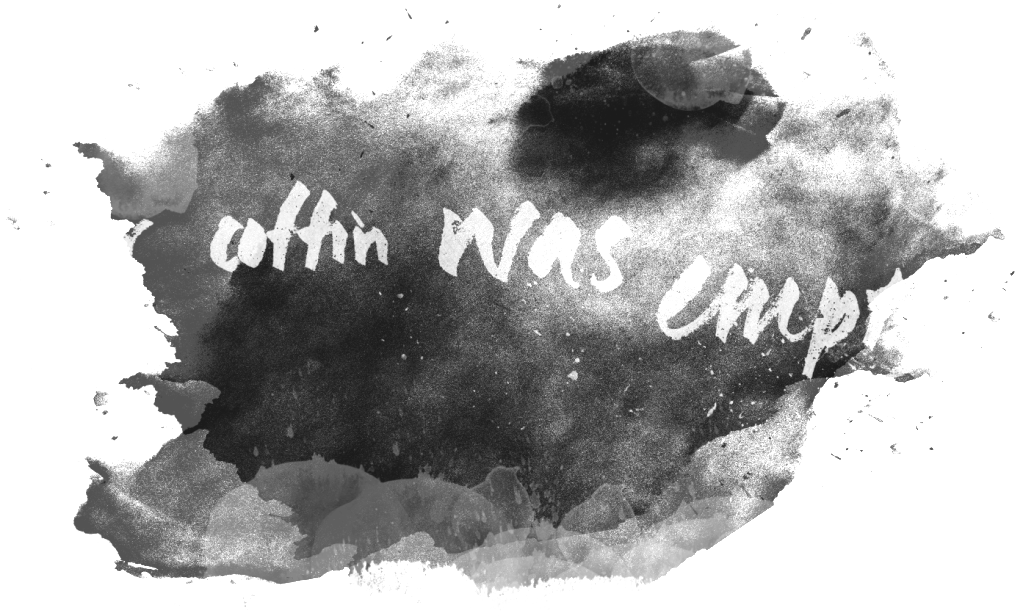
- THIS
PhotographyBen Lowy | IllustrationJane Kim / Ariana Nicolay | DesignUPPERQUAD | Originally PublishedMen's Journal |

